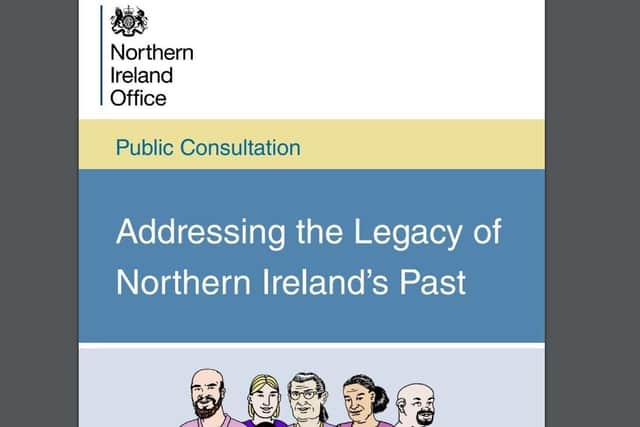Police Fed chair: Legacy plan could put officers in dock and demonise them for policing of Northern Ireland during long terror campaign


Last week, the Police Federation for Northern Ireland and Northern Ireland Retired Police Officers’ Association (NIRPOA) set out our positions on legacy when we appeared before the Northern Ireland Affairs Committee at Westminster.
The measures contained in the proposed legacy Bill are toxic and unacceptable and we ensured that the voice of our members was heard unambiguously.
Advertisement
Hide AdAdvertisement
Hide AdThe proposed legislation has the potential to put officers in the dock and demonise them for how they policed Northern Ireland during a vicious and protracted terrorist campaign.


In our evidence, we told MPs that the Legacy Bill was perverse because it sought to equate the actions of murderers and bombers with the actions of those who worked tirelessly and courageously to bring them to justice and create the conditions for peace.
We also said the bill caused offence as it would allow terrorists to tell their stories without fear of sanction or prosecution — a one-sided narrative where what they did could somehow be justified.
One proposal in the draft would involve the creation of a Historical Investigations Unit (HIU) which would most likely have 1,700 cases on its books.
Advertisement
Hide AdAdvertisement
Hide AdIt would replace the Historical Enquiries Team (HET) which reviewed 1,200 cases, out of which there were only three “that might actually run,” according to former Assistant Chief Constable, Raymond White.
He added that if that figure was extrapolated, you would possibly end up with about ten cases. There is a hard justice and a hard truth to tell the public that really the criminal justice investigatory process has run its course in terms of its capacity to deliver.
There are also major evidential challenges in revisiting old cases from the days before DNA entered the equation.
In some incidents, Mr White recalled that bodies were not even recovered from crime scenes but rather delivered to mortuaries and hospitals, which further hampered investigations.
Advertisement
Hide AdAdvertisement
Hide AdIn overall terms, we said the proposed bill was folly, fundamentally flawed and that Westminster should move to scrap it.
If it persisted with the bill after the general election, then it would have to consider who would be recruited to do the investigating at a time when there is a massive shortage of suitably qualified homicide detectives in the United Kingdom.
An HIU would require a staff of at least 500 investigators, potentially take up to five years to establish and would effectively run as “a parallel police service” with the PSNI. Like the Police Ombudsman for Northern Ireland, there are questions around the lack of accountability of the proposed HIU Director.
One major concern was the absence of any oversight or complaints mechanism to hold this powerful body to account.
Advertisement
Hide AdAdvertisement
Hide AdIn our view, if the government proceeds with an HIU, one option would be that it sits under the control of the PSNI with its own deputy chief constable, who would have sole responsibility for legacy but still reporting into the chief constable, who has the responsibility for upholding law and order in Northern Ireland.
There is the risk that a policing body such as the proposed HIU would set a dangerous precedent.
In my evidence to the committee, I told MPs: “The difficulty there is that if the PSNI can be seen or portrayed as not being trusted to deal in a fair way with events in the past, somewhere down the line, the question may be asked: ‘well, if those detectives can’t be trusted to deal with stuff that happened 30 or 40 years ago, how are they getting it right when they’re trying to prosecute the terrorists and the criminals we have on the streets today?”
Under the draft Bill, there’s a proposed instrument called ‘non-criminal police misconduct’. Chris Albiston, also a former assistant chief constable, summed up our frustration when he told the committee: ‘We do not see any mention anywhere of non-criminal politicians’ misconduct or non-criminal civil servants’ misconduct or non-criminal military misconduct, or non-criminal terrorist misconduct, so why mention non-criminal police misconduct? Because the legislation has been drafted to satisfy the agenda of a particular political grouping within Northern Ireland, and we object to it.’
Advertisement
Hide AdAdvertisement
Hide AdIn effect, with the introduction of non criminal police misconduct, there is the real potential for serving or retired officers to be investigated for something which isn’t even a crime and for which there is no definition, whilst others are not held to account for some of the most serious terrorist crimes, including murder.
Officers would have no or limited rights of access to documentation, disclosure or discovery. We agree with our colleagues in the NIRPOA that the only purpose of non-criminal police misconduct is to facilitate those who wish to make allegations of collusion with no evidence under law of wrong-doing.
Former and serving officers run the risk of having their good names and reputations shredded, and for what? Instead of resolving issues and giving closure to victims, this proposed legislation will merely perpetuate the suffering of all innocent victims and their families, with the very real prospect that there will be no closure or answers possible.
If the government is serious about dealing with the legacy of the past, then this draft bill is far from a sound or sensible starting position.
• Mark Lindsay is Chair of the Police Federation for Northern Ireland